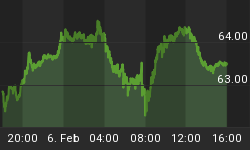Politicians did not get much time to pat themselves on the back for supposedly rescuing the economy with the debt limit deal last week. The ink was barely dry when Standard & Poor's downgraded the US debt ratings anyway, roiling world financial markets. Anyone who has taken an honest look at the government's fiscal situation, taken into account how Washington works and the direction it is going would have a very difficult time arguing with S&P's decision, although a strong case can be made that this was too incremental a downgrade and that it took far too long for S&P to admit the obvious.
Nonetheless, the administration nitpicked over a $2 trillion "mistake". S&P rejoined with the fact that $2 trillion here or there hardly makes a difference in the time frame under discussion. That, if nothing else, should tell you the magnitude of the problem. $2 trillion has become a drop in the bucket.
S&P cited Congress's inability to act like grownups and make necessary, meaningful cuts, which is true. I must take issue however, with their suggestion that tax increases are part of the answer. Taking capital out of the private sector, where it can create real value in the form of new jobs and products, and instead giving it to Washington to waste and squander is not the solution. Tax increases may seem penny-wise to some, but in reality they would be very pound-foolish. The government currently takes in $2.2 trillion in taxes per year, which is far too much already. It spends $3.7 trillion, which is ridiculous and criminal. The problem is runaway government spending, not the American people having too much money.
And yet we can't even have a serious discussion about bringing our troops home and ending our expensive occupations around the world - things the president used to claim to favor!
Even without this downgrade, major investors are waking up to what lies down the road for the United States in fiscal terms. China is showing more signs of losing its taste for our debt. Others are following suit. What we are about to see is the end of the dollar as the reserve currency of the world. When that happens, we will no longer be in a position to have pretend debates about things we probably should spend a little bit less on - we will be forced to implement serious spending cuts as our sources of credit dry up. Of course, we can try to postpone the day of reckoning by printing more money but the resulting "inflation tax" will be far worse than a reduction in government benefits.
Hyperinflation devastates the middle class. After Weimar Germany hyper-inflated their currency in the 1920s, an entire life savings couldn't buy a postage stamp. The bank wouldn't even send customers a check for all the money they had saved their whole lives. It wasn't worth the paper it was printed on or the stamp to send it. This is what is meant when it is said that the middle class gets wiped out. The pieces for this to happen here are all falling into place, and have been since 1971. The only way to avoid that sort of chaos now is for Congress to immediately reduce federal spending and take the Constitution seriously again. The welfare/warfare state will end either way, but winding it down responsibly is a far better way to do it.















